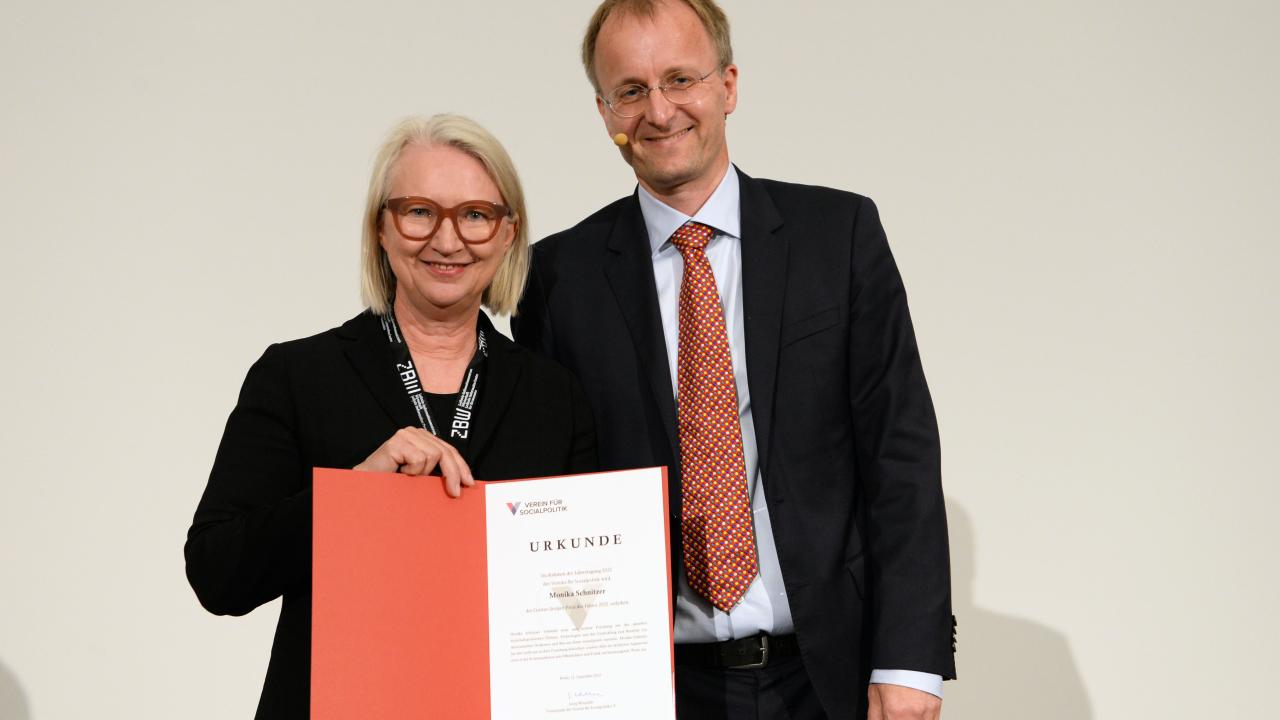Gustav Stolper Award 2022
The Gustav Stolper Award winner 2022 is Monika Schnitzer (LMU Munich).

The Gustav Stolper Award winner 2022 is the competition and innovation economist Prof. Dr. Monika Schnitzer (Ludwig-Maximilians-Universität Munich).
Monika Schnitzer is one of the most prominent German-speaking economists and is particularly known for her successful combination of research and research communication. When she was appointed as a member of the German Council of Economic Experts in 2020, she had already achieved extensive merits in policy advice - e.g. as a long-standing member of several expert commissions. Monika Schnitzer can also show great merits and honors in the purely academic field. In addition to numerous journal publications and an honorary doctorate, her impressive work in several professional societies should be mentioned, as well as her successful role in promoting young scientists.
With the Gustav Stolper Award, the Verein für Socialpolitik annually honors outstanding scholars who have influenced the public debate with findings from economic research and who have made important contributions to the understanding and solution of economic problems in an international context.
The award is named after the economist, journalist and politician Gustav Stolper (1888 - 1947). Stolper became co-editor of the "Österreichischer Volkswirt" in 1913 and emigrated to the USA after Hitler's seizure of power, where he worked, among other things, as an economic policy advisor to the commission of inquiry headed by Herbert Hoover on the economic situation in Germany and Austria.
Monika Schnitzer, like Gustav Stolper, sees a special role in the transfer between academic chair and political decisions. She moves in both worlds - academia and politics - with great commitment. Her early successes during her studies in economics and her doctoral and post-doctoral work in Cologne, London, Boston/Cambridge (USA) and, above all, in Bonn have already made her well-known in the academic world. In the course of subsequent years, several very prestigious universities and other institutions solicited her services. However, Monika Schnitzer always remained loyal to the Ludwig-Maximilians-Universität in Munich, where she has been a professor since 1996, interrupted only by visiting professorships and research stays at some of the most prominent American universities.
In the professional world, Monika Schnitzer has long had the role of a pioneer, in more ways than one. Researchers working empirically used to be relatively rare, especially on the German economist scene. Early on, Monika Schnitzer supplemented many of her theoretical considerations with her own data analyses, which helped her work to gain justified recognition. Through them, she set important thematic priorities, in particular on the importance of combined "countertrade" contracts in international trade as well as on the significance of various incentive effects in corporate takeovers. In the course of her academic work, incentives for innovation became increasingly central. In parallel, the empirical methodology in Monika Schnitzer's work became increasingly important and modern. She is now one of Germany's leading empirical microeconomists.
Successful women are still rare in the economic world today.
Monika Schnitzer has not only accepted the role model function for women that this has created for her, but has shaped it consciously and with positive influence. From the beginning, she assumed responsibility in both national and international committees and opened doors for others in many ways, especially for young academics - female and male. In many roles she was the "first woman" but did not remain the only one.
"Through her clear, objective and incorruptible communication style, she has achieved a great deal in political consulting, in addition to her academic merits, and is now one of the people who it is hard to imagine German political consulting without," said Georg Weizsäcker, paying tribute to the award winner. Georg Weizsäcker is Chairman of the Verein für Socialpolitik from 2021 to 2022.